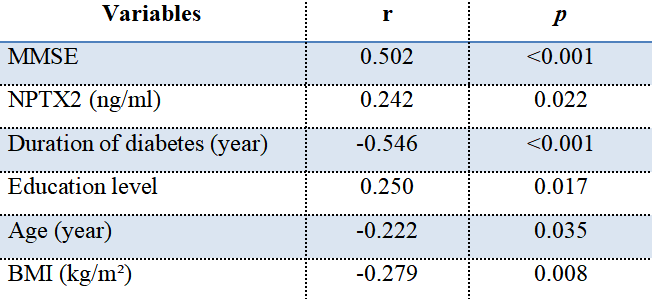Serum NPTX2 and cognitive impairment in geriatric diabetes
DOI:
https://doi.org/10.17305/bb.2025.12632Keywords:
Diabetes mellitus, geriatric patients, cognitive dysfunction, neuronal pentraxin 2, NPTX2Abstract
Cognitive impairment is an increasingly common complication of diabetes, yet its underlying pathophysiological mechanisms remain poorly understood. Neuronal pentraxin 2 (NPTX2), a recently identified synaptic biomarker linked to cognitive disorders, has not previously been examined in relation to cognitive function in geriatric individuals with diabetes. This cross-sectional study enrolled 90 participants—46 geriatric patients with diabetes and 44 age-matched non-diabetic controls. Demographic and clinical data were collected for all participants. After informed consent, cognitive function was assessed with the Montreal Cognitive Assessment (MoCA) and the Mini-Mental State Examination (MMSE). Serum NPTX2 levels were measured by ELISA. No significant differences were found between the diabetic and control groups in age, sex, education level, marital status, smoking history, comorbid conditions, or polypharmacy. However, the groups differed significantly in MoCA scores (p < 0.001), MMSE scores (p = 0.028), and NPTX2 levels (p = 0.048); the diabetic group showed lower cognitive scores and biomarker levels. NPTX2 levels correlated positively with MoCA and MMSE scores and negatively with diabetes duration, patient age, and the presence of microvascular complications. In conclusion, cognitive function was significantly lower in geriatric patients with diabetes than in controls, and serum NPTX2 levels were significantly associated with cognitive performance. These findings suggest a possible role for NPTX2 in diabetes-related cognitive decline and support further investigation of its utility within a broader biomarker panel.
Citations
Downloads

Downloads
Published
Issue
Section
Categories
License
Copyright (c) 2025 Kenan Çadırcı, Muharrem Bayrak, Alev Lazoğlu Özkaya, Gamze Nur Yılmaz, Nur Pak, Büşra Karahan, Hilal Kiziltunc Ozmen

This work is licensed under a Creative Commons Attribution 4.0 International License.









